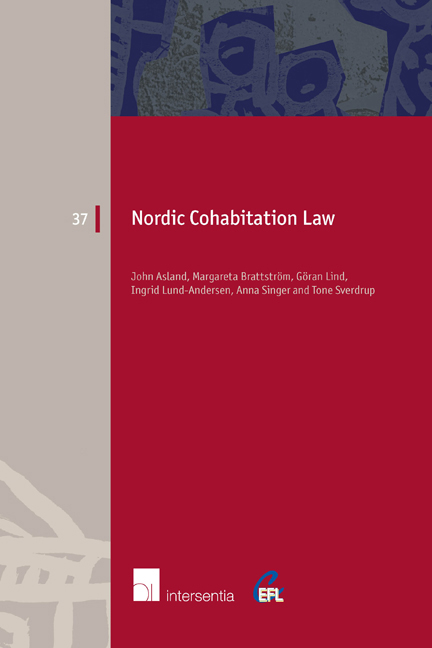Book contents
- Frontmatter
- Preface
- Contents
- Table of Cases
- List of Abbreviations
- Chapter 1 The Development of Cohabitation and Cohabitation Law in the Nordic Countries
- Chapter 2 Property Issues in Cohabitation Relationships
- Chapter 3 Financial Settlements on Termination of Cohabitation
- Chapter 4 The Legal Position of the Surviving Cohabitant
- Chapter 5 The Relevance of Cohabitation for Parental Rights
- Chapter 6 The Distinctive Legal Nature of Cohabitation Relationships and the Need for Legislation
- Chapter 7 Discussion of Legal Policy: Principles for Regulating Cohabitation Relationships
- References
- About the Authors
- European Family Law Series
Chapter 5 - The Relevance of Cohabitation for Parental Rights
Published online by Cambridge University Press: 13 December 2017
- Frontmatter
- Preface
- Contents
- Table of Cases
- List of Abbreviations
- Chapter 1 The Development of Cohabitation and Cohabitation Law in the Nordic Countries
- Chapter 2 Property Issues in Cohabitation Relationships
- Chapter 3 Financial Settlements on Termination of Cohabitation
- Chapter 4 The Legal Position of the Surviving Cohabitant
- Chapter 5 The Relevance of Cohabitation for Parental Rights
- Chapter 6 The Distinctive Legal Nature of Cohabitation Relationships and the Need for Legislation
- Chapter 7 Discussion of Legal Policy: Principles for Regulating Cohabitation Relationships
- References
- About the Authors
- European Family Law Series
Summary
INTRODUCTION – EQUAL OR UNEQUAL
In the 1960s as unmarried cohabitation increased in frequency throughout the Nordic countries, it became evident that there was a growing need to legally regulate these families. Initially most of the legislative attention focused on cohabiting couples concerned public law matters. Society's economic responsibility for the individual was expanding as the modern welfare state developed and as citizens gradually gained rights and access to various forms of social benefits. The fact that no legal status was afforded cohabitation, unlike marriage, meant that social benefits aimed at single people whose finances were not sufficient to permit them to maintain an acceptable standard of living, were also accessible to individuals who were in reality sharing their living expenses with a cohabitant. Married and unmarried couples thus came to be treated differently by virtue of the fact that unmarried cohabiting couples were able to take advantage of benefits designed for single people. For this reason it was deemed necessary to review and adjust the rules to reflect the contemporary situation on the ground.
Review of the rules was however motivated not solely by economic considerations. For other reasons, too, it was considered necessary to look at cohabitants’ reciprocal legal positions. In particular, changing attitudes to various forms of family life and cohabitation – as well as, for many, a desire to distance themselves from the idea of marriage as an institution rooted in the Church – has contributed to an ambition to place cohabitants on an equal footing with spouses in their relations with society. One issue that had attracted attention many years before, as far back as the beginning of the 20th century, was the relationship between a child and the child's parents where they were not married to each other. As it became increasingly common for children to have parents who were not married it was deemed appropriate to end any remaining discrimination in the treatment of children dependant on whether the parents were married or simply living together, for example in matters of custody and parental responsibility.
In all the Nordic countries most of the legal differences between married parents and unmarried cohabiting parents have now been removed. There are however still some situations where the legal position of cohabiting parents and their obligations within the family differ from those that apply to parents in families that are founded on formal marriage.
- Type
- Chapter
- Information
- Nordic Cohabitation Law , pp. 211 - 240Publisher: IntersentiaPrint publication year: 2015



